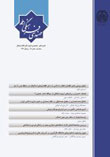فهرست مطالب
فصلنامه مهندسی فرهنگی
پیاپی 45-46 (مهر و آبان 1389)
- تاریخ انتشار: 1389/08/01
- تعداد عناوین: 8
-
صفحه 8
- مقالات
-
صفحه 47
-
صفحه 68
-
Page 10Drawing and formulating the map of cultural engineering is an unavoidable necessity which the supreme leader has repeated referred to. He has reckoned it as one of the main tasks of the Supreme Council of the Cultural Revolution. Cultural engineering as a main and important task is required to investigate comprehensively all different country's dimensions and issues. It is possible here to divide these issues into two main parts. The first includes the subjects and cultural categories affecting the cultural engineeringmap drawing and the second concerns to the methods and procedures centered on how to operate the known subjects and categories. This article also studies the principles and policies centered on the cultural engineering from the viewpoint of supreme leader.
-
Page 18Purification of soul and sprit of human beings from any decline and pollution, moral disturbances, family and social disorders, demonstration of high-rank human and ethical values, promotion of society individual's mental hygiene, fulfilling the human natural potentialities and increase the social efficiency and remove of the sexual disorders are the main reasons to observe and recommend veil and chastity in Islam. The subjectof our article was studied based on the method of article descriptive – analytical method. The results are as follows: identification the consequences of not observing veil and chastity, identification of functions of veil and chastity, focusing on zealotry, calling and encouraging individuals to marriage, sex control, sexual training, identification of punishments for offensive disorders and focusing on the role and significance offamily and educational institutes.
-
Page 38To observe ethical values is one of the most important phenomena which are mostly considered in many organizations. Therefore, this article, trying to make leaders of educational institutes to become familiar with virtues and ethical values as much as possible and propagating them in work place which causes organizations’ permanence, tries to describe ethical leadership in educational organizations which is the result of sophisticated interactions of values, thought and behavior. There is hope that educational leaders having such values and behaving according to ethical principles observe management regards as well as ethics.
-
Page 47Spirituality at work is a beyond of a usual debate. Work place has changed and turned into a place for human development. Humans are looking for a meaning beyond of economic and financial issues in their works. Hence, leaders and managers of organization try to use the spirituality in the organization and especially in organizational culture to direct and organize the organization to their aims, values and. Some of researchers believe that transitional leaders in organizations use spirituality to lead and transition in theirorganizations. Leaders try to increase profitability, job satisfaction, group work of people and commitment.
-
Page 55Globalization is an extending process that has covered all the societies’ dimensions and institutions. It has also drawn a great deal of attention. Nowadays the globalization has brought up many changes and resulted in many intellectual and thoughts interactions and contributions. These changes have caused many changes in the education systems throughout the world. Globalization is the most outstanding features of current education according to the specialists and experts in educational system. This can be consideredas a new experience. Globalization has influenced the society's religious culture and religious training. It also has fathered same opportunities and threats in the religious training field whose recognition and identification can pave the way for educational systems to encounter correctly this expanded phenomenon in the religious trainingfield.
-
Page 62Development at universities depends on benefiting a desired and harmonious culture and science with a society’s ideals and beliefs. Higher education system as the main and central institute of transiting culture and science must undertake its responsibility in a harmonious manner to mix the development and science creation with ethical and value direction of society. Only in this way it is possible to provide the ground to promote and develop a society. This article studies and analyzes the need of science development andhow to indigenize the sciences and technologies through a glance to the indigenization process in the countries such as Germany, Japan and Vietnam. Generally speaking; any kind of perception of scientific and belief changes must be mixed by a sustainable and dynamic culture of universities and macro system at a society.
-
Page 68Entrepreneurship is considered as one of the cheapest and the best tools to make economic development in different countries. It has also gained the best results and the utmost efficiency. The culture of entrepreneurship is of high significance and importance. The concept of entrepreneurship based on a descriptive analytical method was studied in three individual, organizational, and national levels. Different countrie's experiences were used. Some features and characteristics such as self-confidence, risk taking, innovation, flexibility in planning, result concentration as individual factors and grouping, traditionalism,fulfillment as the national factors in the process of entrepreneurship were identified.Keywords: entrepreneurship, culture, organizational culture, development


